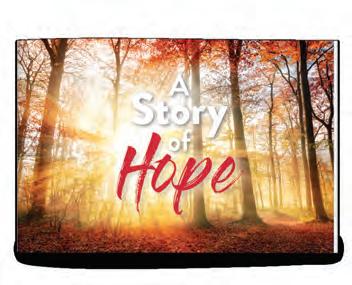
Steve, a friend of mine, is a selfmade man.
While he wasn’t academically inclined in school, he had a talent in art and photography. And though his family didn’t think he would go far with them, Steve persevered, honing his skills and working hard as he chased his dream of becoming an award-winning photographer.
He succeeded eventually, and found himself with everything others would dream about: a successful career, a happy marriage, and enough money to buy anything he wanted. He was also well-respected in his field, and younger photographers sought him out to be a mentor.
In society’s eyes, Steve had “made it”. He did what he loved and got paid handsomely for it. He even won over his parents’ approval and praise. Successful, recognised, and respected. What else could Steve possibly need?
And yet, in our most recent conversation, my friend told me privately that something is still missing from his life.

“I make money, go for holidays, make more money, go for more holidays . . . but it’s starting to feel all the same,” he told me. “I don’t know what I’m doing this for. The things that were fun and fulfilling don’t feel the same way anymore. If I die tomorrow, what would have been the point of my life?”
Made for a Deeper Purpose?
It didn’t make sense. To me—and many others—Steve would seem to have achieved everything that we need in order to have a fulfilling life.
At least, this is what popular psychological models tell us. According to psychologist Abraham Maslow, all of us have a hierarchy of five needs that make us feel fulfilled:
provision (food, water, warmth, and rest)
(security)
1.
2. Safety
3. Belonging
relationships)
Physiological
(intimate friendships and
4. Esteem (prestige and accomplishment) 5. Self-actualisation (achieving one’s full potential)
2. Variety
3. Significance
4. Connection
5. Growth
6. Contribution
A more recent model, proposed by motivational speaker Tony Robbins, suggests that we have six core needs: 1. Certainty (the assurance that you can avoid pain and gain pleasure)
(the need for the unknown, change, and new stimuli)
(feeling unique and important)
(feeling love or closeness with someone or something)
(an expansion of capacity or capability)
(a sense of service and focus on helping others)
According to both models, Steve had ticked all the boxes, and therefore should have been living a life of great fulfilment. But he wasn’t. Somehow, meeting all his needs for happiness and satisfaction didn’t seem to give him true satisfaction. Something was still missing.
Is there something that these models have failed to grasp? Is there a greater purpose to be found in something other than a life focused entirely on oneself?

How can we decide what we need, when we can’t tell what the future holds for us?
A Purpose Beyond Ourselves
Perhaps this is the limitation of these popular psychological models: they begin and end by focusing on the self. But then, that’s what modern culture is all about—it endorses our heart and its desires as the compass for our lives. We are told that what we feel and what we want is the most important thing for us, and we are encouraged to pursue our dreams, for they will surely lead us to where we’re supposed to be.
We are also constantly reminded that we should not allow anyone else to tell us who we are and what
we can or cannot do. In a world that champions freedom and autonomy as life goals, we are encouraged to believe that only we know what’s best for ourselves.
But using ourselves to navigate ourselves is a risky business. It assumes that we know ourselves fully. But how can we know what’s best for us, when we can’t always perceive our inner worlds clearly? How can we decide what we need, when we can’t tell what the future holds for us?
And what if we listen honestly to our hearts? Though most of us feel an inherent sense of what kind of lives we want—something purposeful, meaningful, safe, filled with love— we often have absolutely no idea how to get there.
Some of us may also feel caught in between wanting to take control of our own lives, and being afraid of the responsibility. We might feel paralysed by having too many options before us, or too inadequate to manage the implications of our choices. Or, we fear that making one choice means missing out on something better . . . it’s enough to give anyone anxiety!
And so, we continue to be confused by all the different advice that society gives us, strategies on self-fulfilment by self-help books, and our own feelings. Some of us might give everything a go, in the hope that one of them will work. Some of us will find ourselves exhausted by the effort of chasing after every newfangled strategy to achieve happiness and satisfaction. Others, like Steve, might succeed—only to find that true happiness and satisfaction remain elusive.

Knowing Who Made Us
When a company or inventor comes out with a new innovative gadget, like a mobile phone, they will often hold a tech conference to show it off and tell everyone how to use it as it was designed for. After all, they wouldn’t want us to miss its best features, and use it for the wrong purpose. They also give us a user manual, to show us how to use their invention.
Of course, we can use these gadgets for other purposes. An underused camera, for instance, can
become an efficient paperweight.
But if we want to get the most out of a device, to truly understand its purpose, we have to discover the designer’s original intention. Only the designer can tell us what he made the gadget for. Consider how this truth can also apply to understanding the purpose of our lives. Perhaps, in a similar way, to discover the purpose of our lives, we need to consult the One who made us.
Perhaps the question isn’t, “What is it all for?”, but: “Who is it all for?”


You are a labour of love, created to be loved and cherished by God.
You Are God’s Masterpiece
The Bible, on which the Christian faith is based, says that every life is an intentional creation by God, the Great Designer. Every life is unique and made for a specific purpose. A king once wrote that God “made all the delicate, inner parts of my body” and “knit me together in my mother’s womb” (Psalm 139:13).
Knitting is a precise, methodical craft. Knitters need to follow a clear and structured pattern to create the desired item, like a scarf or sweater. It also takes real passion and heart to knit
something that is beautiful and useful.
The word “knit” thus reveals the marvellous process and heart that motivated God as he created you. God used great skill and passion to form the core of who you are. You are not here by chance, but you have been thoughtfully and lovingly woven together. You are God’s masterpiece, his finest craftsmanship and handiwork.
At the same time, knitting is a deeply intimate process. It’s nothing like the impersonal process of mass production. A knitter’s hands continually touch and work with the wool—conveying how tenderly God formed you. You are a labour of love,
created to be loved and cherished by God.
No wonder the same king also writes: Thank you for making me so wonderfully complex! Your workmanship is marvelous—how well I know it. (Psalm 139:14)
Isn’t it incredible to know that the Creator of the universe made you personally and carefully for a unique purpose? And that he has a deep interest in your life?
The amazing thing is, God is not seeking to keep his plans for us secret. In fact, he longs to share his purposes for our lives with us. That’s why he gave us the Bible, the “user manual” for our lives, so that we might discover what they are—and who he is.
Would you like to discover God and his purpose for your life?
If you want to know more about God and his plans for you, talk to a Christian friend or visit ymi.today/questioningthe-faith/




You can also read A Story of Hope, a short and easy to read booklet that can tell you more about the Christian hope. Scan the QR Code to read it online, or contact us if you would like to receive a print copy. Check out odb.org for more print and digital resources by us!
© 2021 Our Daily Bread Ministries. All rights reserved.
Scripture quotations are taken from the Holy Bible, New Living Translation, copyright ©1996, 2004, 2007. Used by permission of Tyndale House Publishers, Inc., Carol Stream, Illinois 60188. All rights reserved.
Images used under licence from shutterstock.com
Written by: Nicole Ong









